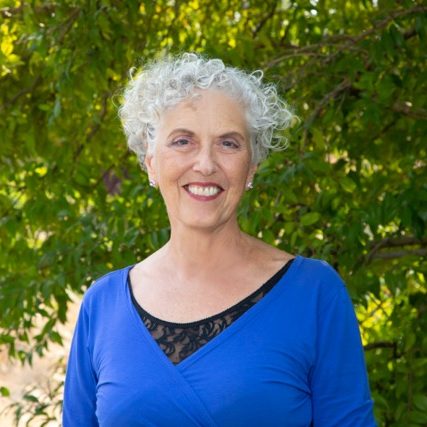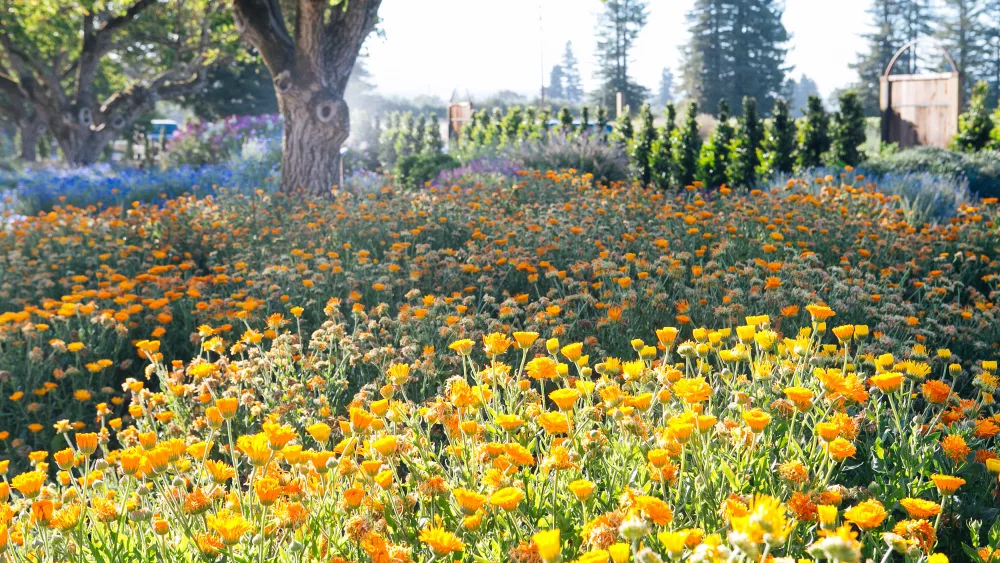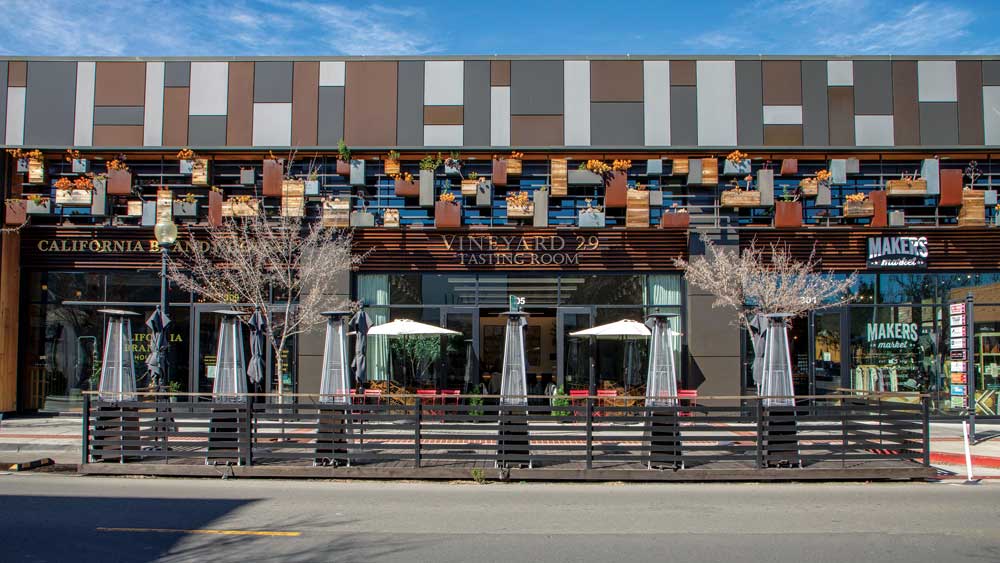
Like almost everything spawned by the 2020 pandemic, “parklets” have generated controversy.
Restaurants that were kept alive by those open-air structures that allow patrons to eat and drink on cordoned-off parking spaces or other sections of the public right-of-way? Loved ‘em.
The non-gustatory establishments whose clients could not find a place to park downtown when they came to get their nails done? Hated ’em.
In our mild climate that even in January can have 70-degree afternoons, many people enjoy the cosmopolitan feel of street-side dining. Others have been heard saying, “I don’t relish eating in a parking lot” which, depending on the parklet, might not be an exaggeration.
As pandemic-era restrictions relaxed in 2022, temporary outdoor dining programs began to sunset and local city councils across the North Bay had to address the realities of moving to permanent outdoor dining programs—or not.
As 2023 began, some town councils had implemented new ordinances with enthusiastic support; at least one had ended its parklet program entirely; and a couple have yet to make up their minds.
Windsor
In the Sonoma County town of Windsor, condo denizens who thought it would be exciting to live in a mixed-use development one story above the street with views of the Town Green say they have suffered because of the parklets. Most vocal among them is Larry Laba—he and his wife, photographer Barbara Bourne, bought their McClelland Drive unit in 2014. The restaurant Kin is below.
Prior to the pandemic, the couple agreed to allow the restaurant to put a roof on its sidewalk patio on the Marshall Street side of the building. “I was trying to be a good neighbor, so I consented to the roof,” says Laba. “To my fault, I did not ask what kind, and was disappointed to see a corrugated roof.” Laba, who has spent time in Europe and lives a couple of months a year in Medellín, Colombia, considers the aesthetic of corrugated roofs “third world.” Because his condominium is on a corner, he felt that Kin’s side patio roof was a compromise he could live with. Then came COVID’s indoor-dining restrictions and the parklets.
Not only was Laba’s view of the Town Green hindered by “a second ugly corrugated roof,” but noise generated by a 60-seat parklet and cigarette smoke drifted up into their and their neighbor’s space. “In the summer, we had to keep our windows and glass doors closed. This is not what we chose,” he says.
He says he understands why the parklets were necessary during the pandemic—but was given the impression they would be temporary.
“I was told that they would be discontinued at the end of 2021,” says Laba—but then that was extended to the end of 2022 to allow restaurants to recoup more of their losses.
“The expiration date has arrived,” he says. “We are OK with all the restaurants with side patios, but we think the parklets are an eyesore in our downtown. They were supposed to be temporary and we’d like to see them gone.”
Another condo owner, Rhoann Ponseti, shares Laba’s sentiments, and adds:
“While economic development is always the most important factor in the town’s efforts, the entities being considered as economic contributors are always businesses.”
Ponseti says Windsor shouldn’t overlook the hundreds of thousands of dollars residents pay to purchase property—or the thousands in property fees each year to support the “symbiotic relationship” with the town. “Our home values will surely be downgraded as we must disclose the [parklet] situation when we attempt to sell our properties in the future. We did not bargain for, approve, nor consider we’d be living under these conditions,” says Ponseti.
In spite of their passions, these homeowners say they understand the challenges restaurants face, but emphasize that residents need to be included in the planning. Other places in Sonoma County don’t have the same population of above-parklet residences as Windsor where there are literally hundreds of homeowners and renters residing near or over parklets. “We live here 24/7,” Ponseti continues. “Windsor downtown is more than a strictly-business district. It is our neighborhood.”
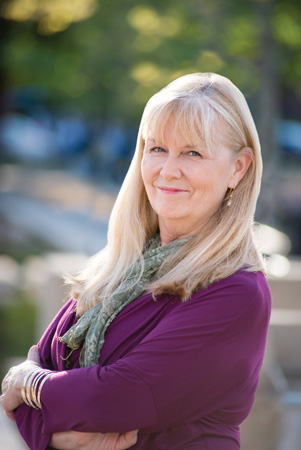
When parklets first appeared, some retail businesses which were not part of programs to extend operations out into public parking spaces objected because of the loss of parking. Jewelry store owner Laurie Shimizu, of Mark Shimizu Design at 9070 Windsor Road, has a different attitude.
“My customers for the most part have not complained, but if they do, I say, ‘It’s good for your health to walk a block,’ says Shimizu. “I think maybe it would be helpful to have timed parking so that residents and employees don’t stay all day in parking spaces customers need.”
Shimizu, who has been in business at her location for 15 years, says that the Flagship Taproom’s parklet next door adds to the vibrancy of her block. She likes the “European feel and sense of fun” the parklets provide.
“It was such a wonderful idea during the pandemic to help the restaurant industry—and that gave us permission to come out and socialize safely,” adds Shimizu. “It was convivial and positive. We needed that. And now, if we decide to keep them, the city has to work diligently to address everyone’s needs. It’s all about give and take and the community evolving.”
Windsor Economic Development Manager Tim Ricard and his staff were tasked with presenting information at a Feb. 1 city council meeting about potentially making the Temporary Outdoor Dining and Commerce Program (aka parklets) permanent. The Windsor parklet program was set to expire March 31. In the meantime, decisions needed to be made about parking mitigation, the process for permitting, the annual rental fees, and creating Ongoing Parklet Program Guidelines for those parklet owners who decide to retain them. Guidelines will include things like ADA regulations for flush-with-curb flooring, traffic barriers and, presumably, size and aesthetic qualities of the structures.
The February meeting’s purpose was to collect council and community feedback and come up with a timeline to implement the feedback for the planning department because of needed changes to the zoning code. Attention will continue to focus on improving parking in the downtown through the formation of three hour time limited parking and the creation of up to 45 additional parking spaces.
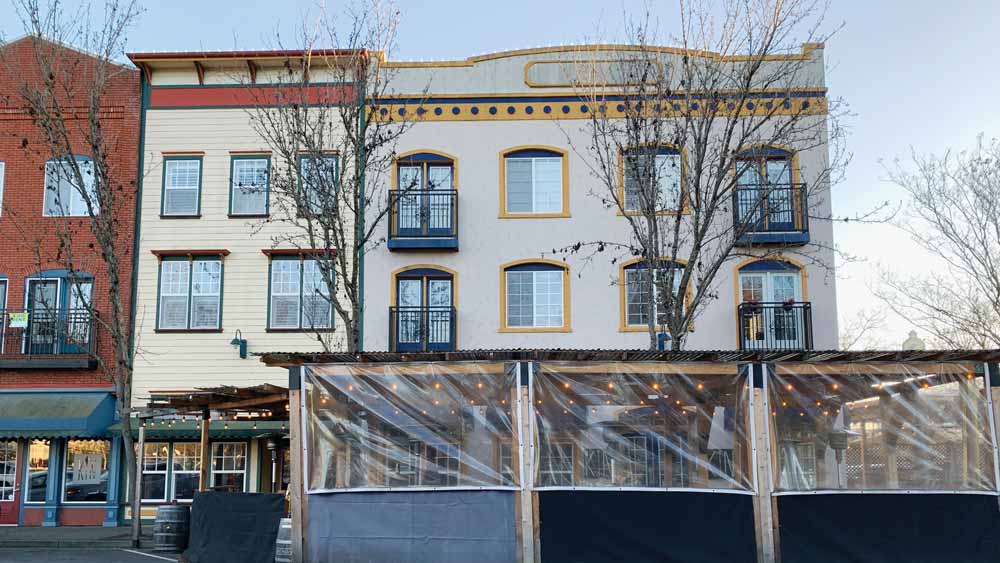
“The staff recommendations are for a three-year OPP (Ongoing Parklet Program),” Ricard says. “In order for the business owners to invest money to meet codes and guidelines, they have to have some time certainty to meet requirements and recoup their investments.”
On March 15, the Windsor Town Council voted 5-0 to extend the Temporary Outdoor Dining and Commerce Program and voted 3-2 to amend the city’s zoning code, as part of a three-year pilot program to include regulations governing parklet design and construction. Included in the proposed ordinance are modification of parklet hours and the disallowing of any overhead elements (only portable umbrellas permitted). These guidelines may address some of the residents’ complaints about the Windsor parklets.
Healdsburg
Healdsburg is ahead of Windsor in its move from a free temporary parklet program to an ongoing program and has been less ambivalent about the fiscal and social advantages of retaining the parklets. Merchants were required to sign up in January 2023 for a three-year OPP agreement to cover rental and fees for parklets.
Tai Tokugawa owns Taste of Tea Japanese Restaurant, a family business which has been at its 109 North St. location for eight years. Her 20-seat parklet uses sleek concrete planter boxes for the required safety bumpers and manages to pull the calm, tasteful décor from within the establishment to her street-side setup.
She declines to say how much it cost to build Taste of Tea’s parklet in May 2021, but it would “certainly cost more to tear down.” She has yet to recoup the construction expense, but says having the parklet is “so far, worth it. Our customers love it.”
“We’re a walking town for tourists and locals alike,” Tokugawa continues. “I don’t think the loss of parking spaces is a big deal.” Officials recently added 40 parking spaces near Healdsburg City Hall and there are multiple public lots in the downtown.
Next door to Taste of Tea is Portalupi, the best place to enjoy wine “made in California with Italian parts.” Tasting room director Carolyn Brandt is co-owner with Jane Portalupi and her husband, winemaker Tim Borges; the couple founded Portalupi Wines in 2002. The tasting room has been at 107 North St. for 11 years. Their parklet was added in the summer of 2020.
“We were one of the first to invest, and since there was no charge at the beginning, we put our money into a well-designed structure that our customers absolutely love. Initially, the roof was only an awning, but that wasn’t adequate, so we added a roof and then shades that go from ceiling to floor. People even sat out there when it was raining,” Brandt says. “We plan to keep it as long as the city allows.”
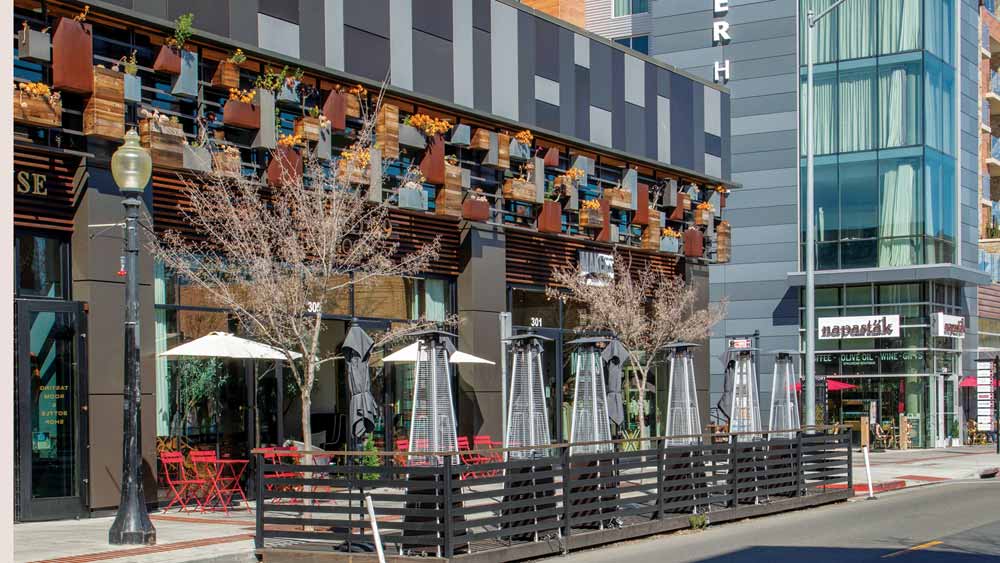
From her point of view, Portalupi’s parklet has been a great addition to their business. “People like the feel of them and it has helped the community focus on the positive.”
Around the corner from Portalupi and Taste of Tea, at 333 Center St., a smiling Dante Godinez stands in the doorway of Healdsburg Running Company (HRC) holding a portable massager on his sore hip. He has worked at the store for six years and is more than willing to enthuse about their non-restaurant parklet that holds not only boxes of athletic shoes for sale, but also four benches and comfy seating areas.
“We wanted to be included in the program with the wineries and restaurants who brought business outside during the pandemic,” says Godinez. “We are a small town and believe in neighbors helping neighbors.”
The 21-year-old Healdsburg native says that the HRC parklet is multi-purpose—a popular place where folks can hang out and talk; and it is the starting spot for free community runs hosted by the store on Tuesdays and Thursdays.
“There’s not really room inside, so this extra space has helped the 20 or so runners to gather,” he says. “We arrange with a local pub or restaurant to end there and socialize after the run. Whole families can participate. It’s a bonding thing and a lot of fun.”
Carter Lindstrom-Dake is sales manager for Thumbprint Cellars, a boutique winery founded by his parents, with positions from winemaker to wine-club manager currently filled by family members. Thumbprint’s parklet, built in 2021, seats about 25 patrons at 102 Matheson St. on Healdsburg Plaza. The tasting room and gallery have been located in town for 14 years.
“The value far outshines any obstacles we’ve dealt with,” he says about Thumbprint’s recent signing of the 2023-2026 Ongoing Parklet Program agreement. “It has added so much potential to our business and the city did a great job on rules and parklet amenities.”
Lindstrom-Dake does report some disappointment with “the degree we were allowed to participate.”
“We would’ve loved the opportunity to work with public officials more, to allow what our general research had shown happened in other cities,” says Lindstrom-Dake. “For instance, Denver offered subsidies for fees, or the ability for businesses to apply for cash grants to help get their parklets into compliance.”
Santa Rosa
As if in response to the wish for some kind of financial assistance for parklet build-outs, officials in Santa Rosa have implemented a grant program for façade and parklet improvements in conjunction with the city’s permanent parklet policy. A storefront business can apply for financial aid to create a parklet not only consistent with the design of the building, but also to enhance the exterior appearance and commercial viability of a storefront business. The grant, however, is only available to properties within qualifying districts in Santa Rosa city limits. Gabe Osburn, deputy director of Development Services, says the façade-improvement grant through Santa Rosa’s Small Business Support Program was developed after the American Rescue Plan Act (ARPA) of 2021 was signed into law.
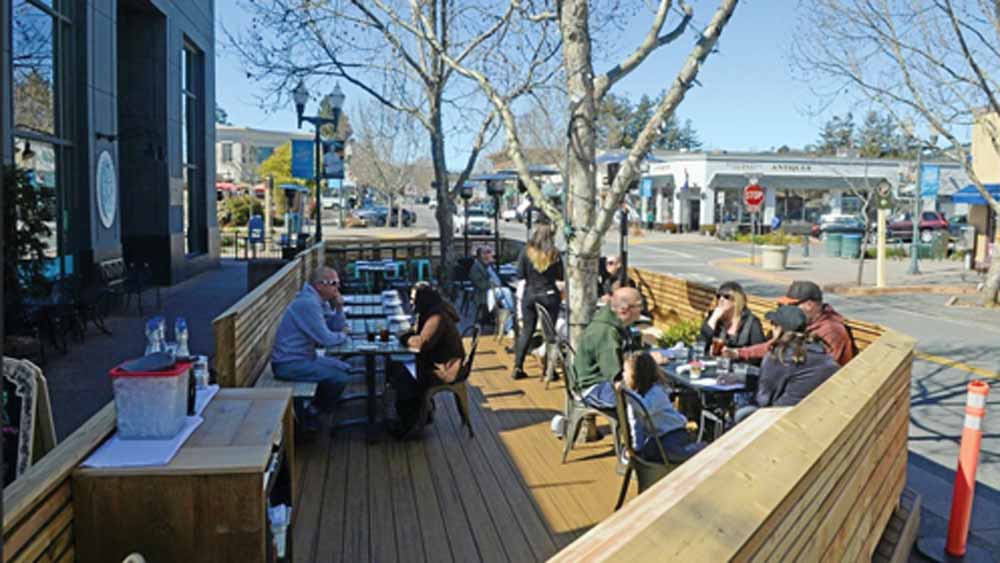
“In order to further incentivize the process of activating our downtown, there is no per-square-foot rental charged for the parklet space,” Osburn notes. “There are fees, but the fees are only one time.”
Since Santa Rosa’s permanent parklet policy went into effect in June of 2022, eight applications have been submitted and one has been issued (for Ausiello’s Fifth Street Bar & Grill which has not yet begun construction). Any business in Santa Rosa can apply for a parklet; there is currently not a hard cap on the numbers. Study sessions have shown that most of the stakeholders think properly managed parklets are a positive thing to encourage more foot traffic and an abundance of visitors to the downtown core.
(All details associated with the installation of a parklet can be found in a 30-page manual at srcity.org.)
“This is one of the more complicated things to have happened in Santa Rosa,” Osburn admits, “so we are keeping the communication channels open to hear from anyone who is impacted. Feedback is accepted any time. We can’t know everything ahead of time so we will adjust if we need to.”
Sonoma
Madolyn Agrimonti has worked for a state senator, as a nonprofit organization executive director, and served as a city council member in Daly City for 12 years and in Sonoma for eight years. Her term in Sonoma ended with the December 2022 meeting in which the council put the kibosh on the town’s parklets.
“I was 100% in support of the parklets at first, because we needed something to help the businesses survive during the pandemic,” Agrimonti says. “But then it became like the Wild West out there!” She notes the size of the parklets and aesthetics “were all over the place” and there was a notable lack of code enforcement.
“We went for safety first and they procured these big orange barrels and K-rail barriers,” she says. “But accidents were still happening—a bike ran into one of the barrels and caused a bolt to come loose from above and hit a customer on the head; he needed stitches. Not all the accidents were reported.”
Agrimonti says that many retail stores around the city plaza complained about the lack of parking for their customers, the traffic snarls and the changed look of the town. Sonoma is notoriously short of parking and the loss of about 60 spaces to the dining and wine-tasting expansions was significant. She thinks that maybe if the parklet program had been more controlled from the beginning or had responded more effectively to negative public input, her ultimate response would have been different.
“People who lived here a long time didn’t like how the plaza looked; there were public comments and letters to the editor. Sonoma is beautiful and they thought the parklets were ugly,” Agrimonti says. “I’m glad about how it turned out.”
She and fellow councilmembers Bob Felder and Kelso Barnett were in the 3-2 council majority who voted against retaining the parklets in Sonoma. None of the three ran to retain their seats on the council in the November 2022 election.
City of Napa
Napa Community Development Director Vin Smith says residents and businesses alike embraced their Parklets/Shared Space Program enthusiastically. The restaurants and tasting rooms that set up shop in the public right of way (i.e., sidewalks, plazas, parking spaces) during the COVID-19 emergency are now working with the city to formalize their licensed participation in what has been named “Napa Al Fresco.”
The city council voted unanimously to set up an application process, design standards and a fee of $10 per square foot per year, renewed annually. (A two-parking space parklet is about 400 square feet.) Guidelines ensure that the locations and activities are safe, equitable, compatible with surrounding uses, accessible to everyone and that public property is maintained. The Napa Development Department is working with 14 businesses currently—all restaurants or tasting rooms—to get them through the permitting process.
“We only lost one restaurant due to the pandemic,” Smith says. “It absolutely helped the rest of them survive.”
The Napa parklets are concentrated in the downtown area and are allowed to include only tables, chairs and umbrellas. If the space previously had a roof structure of any kind, it must be dismantled under the new guidelines. “Some enclosed parklets looked like an added room,” Smith notes. “The intent of the parklet is to use the city right of way for seasonal al fresco dining, not as a complete expansion of the restaurant.”
Novato
Henry Hautau’s bread and butter is Compass Real Estate, but he is also “the guy who put in a parklet first in Marin.”
He opened Finnegan’s Restaurant & Bar at 877 Grant Ave. in Novato 17 years ago and claims he spent several years—before the pandemic and the word “parklet” entered the lexicon—trying to get the city manager to allow him to use public “flex space” to build a patio for outdoor dining.

In the spirit of his grandfather, Patrick Finnegan, who opened a neighborhood pub in New Jersey in 1980, Hautau understood the importance of a place for locals to eat, drink and congregate as a community.
“We spent more than $40,000 to design, engineer and construct the parklet; we brought jobs, more tax revenue and, most importantly, increased vibrancy. We even had some customers say it was one of the greatest things to happen to our downtown. A few businesses voiced concerns about reduced parking, but overall, when they saw what kinds of crowds it brought, many neighbors on the block thought parklets were perfect for Novato.”
Hautau the restaurateur says the ability to serve 25 or more people outside was a lifeline for his business in the last two years and will continue to be a revenue source, even with indoor dining allowed again.
“It would be very challenging to survive without our patio. Sometimes the inside [capacity 97] will be almost empty when the outside is packed. There are customers who prefer to only dine outside these days.”
Hautau the real-estate agent says that clients “coming from the south, like Burlingame, Atherton” are happy to see the retail growth and want to live somewhere with “a cute, vibrant downtown and some of the best weather in the North Bay.”
The Downtown Parklet Licensing Program was passed and adopted by the Novato City Council on May 10, 2022, by a vote of 4-1.
To benefit the general public
No matter what title has been chosen for them, the parklet ordinances adopted in the three North Bay counties have similar formats, content (such as legal process, rules, aesthetic guidelines) and official language. What they also have in common is the stated purpose for all this work and effort: to benefit the general public by allowing safe, accessible commercial activity, enhancing the shopping, entertainment and dining experience through increased use of public spaces and right-of-way.
That seems to be something everyone can agree upon.
Sonoma’s ‘historic’ parklet decision
Former Sonoma City Councilmember Kelso Barnett was serving as vice mayor in 2022 when he joined the 3-2 majority voting to put the kibosh on the city’s parklet program. Barnett cites the Sonoma Plaza’s landmark status as the primary reason for his no-on-parklets vote:
“Downtown Sonoma is different from neighboring cities in a fundamental way that affected any potential parklet plan. Our entire Plaza district is a national landmark. Some say the northeast corner of our Plaza, with the last of the missions and the site of the Bear Flag Revolt, is one of the most prominent historic sites in California.
“As such, the City of Sonoma can’t take advantage of exemptions from the California Environmental Quality Act (CEQA) that other cities could use as part of their planning process to permanently keep their parklets. Exemptions cannot be used in projects that involve historic resources.
“The process would have become much more complicated and expensive for both the city and the parklet operators. Consultants would be required to develop design standards, historic experts would have to approve the general program as well as individual parklets, and ultimately building these approved parklets would not be cheap.
“I loved the energy the parklets and European-style outdoor dining brought to our Plaza, but I supported doing it the right way, thus my ‘no’ vote.
“Instead of spending resources to make a temporary pandemic program with structures in the street permanent, I hope the City of Sonoma will invest in a long-term Plaza masterplan, with the ultimate goal of extending sidewalks to create more outdoor dining opportunities, in a way that does not detract from our national landmark Plaza.”


